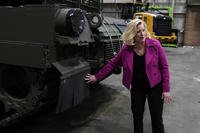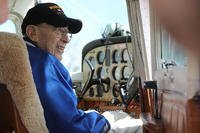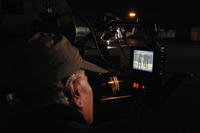 "Civilian casualties in Iraq's volatile Anbar province would have been greatly reduced over the past 20 months if an inexpensive, hand-held laser system had been sent to the Marines operating there, according to a series of e-mail messages between troops in the field and acquisition officials in suburban Washington" obtained by the Tampa Tribune. "A military official who spoke on the condition of anonymity said close to 50 innocent Iraqis were killed and nearly 140 were wounded in Anbar between March and December by Marines who did not have the dazzlers as an alternative to lethal force."
"Civilian casualties in Iraq's volatile Anbar province would have been greatly reduced over the past 20 months if an inexpensive, hand-held laser system had been sent to the Marines operating there, according to a series of e-mail messages between troops in the field and acquisition officials in suburban Washington" obtained by the Tampa Tribune. "A military official who spoke on the condition of anonymity said close to 50 innocent Iraqis were killed and nearly 140 were wounded in Anbar between March and December by Marines who did not have the dazzlers as an alternative to lethal force."
The decision to deny delivery of the Compact High Power Laser Dazzler has touched off an internal debate, the messages reveal, with highly charged phrases such as "unnecessary carnage" being used to describe the situation...
The dazzler is a nonlethal tool for steering unwelcome vehicles and people away from U.S. checkpoints and convoys. Without it, U.S. forces must open fire when Iraqis fail to heed warning signals and get too close...
Made by LE Systems, a small company in Hartford, Conn., the compact laser creates a wall of intense green light that stops or redirects oncoming traffic by temporarily impairing the driver's vision.
In June 2005, Marine Corps leaders in western Iraq filed an "urgent universal need" request for several hundred of LE Systems' dazzlers, which cost about $8,000 each. The request, which was repeated less than a year later, has gone unfulfilled.
The dazzler order appears to have been made by Marine Corps Major General Richard Zilmer, who's heading up the coalition effort in western Iraq. He is emerging as a extremely interesting figure. First, he tells Congress that the Marines "needs [the] capability" to deploy through space. Then, once he gets to Iraq, he sends an "urgent request" to the Pentagon, asking for new gear. At the top of his list: a "priority 1" plea for 183 renewable power stations, equipped with "solar panels and wind turbines." By reducing the need for [petroleum-based fuels] at our outlying bases, we can decrease the frequency of logistics convoys on the road, thereby reducing the danger to our Marines, soldiers, and sailors," the request stated. So far, however, the response to Zilmer's renewable-power request has been limited. A single station is being examined for research and development, sources tell Defense Tech. And the Army's Rapid Equipping Force is putting together four alt-power units: two trailer-sized, and two as big as "connex" cargo containers. It's a start, for sure. But it's a far cry from what Zilmer asked for.
(Big ups: Haninah)
50 Iraqis Dead from Laser Shortfall?
© Copyright 2024 Military.com. All rights reserved. This article may not be republished, rebroadcast, rewritten or otherwise distributed without written permission. To reprint or license this article or any content from Military.com, please submit your request here.








